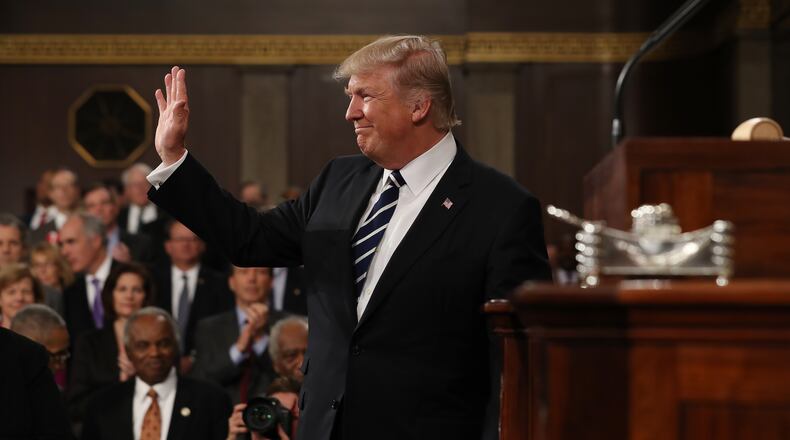President Donald Trump revived the populist rhetoric that helped propel his rise to the top of the Republican ticket and later the White House while urging lawmakers to cast aside partisanship to work with him to overhaul the tax code and rebuild the nation’s health care system in his first address before a joint session of Congress.
Forty days into his presidency, Trump indicated in his hourlong speech that he was not softening on key campaign pledges to build a wall on the southern border and take a more hard-edged approach to immigration and terrorism.
“We cannot allow a beachhead of terrorism to form inside America — we cannot allow our nation to become a sanctuary for extremists,” Trump said.
His address was notably more restrained and disciplined than the winding speeches that became his signature on the campaign trail. It was also free of the cutting comments against the media and political opponents that have become the norm on his Twitter account and in press conferences.
The opening minutes of Trump’s address focused on his accomplishments during his first weeks in office, including approving the Keystone XL pipeline, implementing a federal hiring freeze and imposing a five-year lobbying ban on executive branch officials.
He specifically mentioned his campaign to pressure Lockheed Martin to keep costs of the F-35 stealth fighter jet under control. A portion of the plane's wing is assembled in Cobb County.
Trump said he was eager to work with Congress to fulfill other campaign promises, such as confirming conservative federal judge Neil Gorsuch’s appointment to the Supreme Court, bolstering education choice and passing legislation to rebuild the country’s infrastructure.
“Everything that is broken in our country can be fixed,” Trump told a crowd of lawmakers, Supreme Court justices and diplomats assembled in the chamber of the House of Representatives. “Our citizens deserve this and so much more, so why not join forces to finally get it done?”
Republicans in Congress came into Tuesday’s speech looking for more details on Trump’s major policy plans, particularly on health care, as efforts on Capitol Hill to quickly repeal the Affordable Care Act have stuttered.
“There’s a lot of things we need to be working on very quickly and we need to know where the White House is on all these issues,” said U.S. Rep. Barry Loudermilk, R-Cassville. “Let’s push a lot of these decisions back down to the state and local level, where it’s closer to the people.”
But they were not given much new detail, as is common in most presidential State of the Union addresses.
Most Democrats, meanwhile, sat stoically in the House chamber.
In the hours leading up to the speech, many of them sought to frame Trump’s promises as hollow.
“This president has shown, throughout his campaign for the presidency and now his first month in office, that there is a yawning gap between what he says and what his administration actually does for working Americans,” said U.S. Senate Minority Leader Chuck Schumer of New York. “He talks like a populist but governs like a pro-corporate, pro-elite, hard-right ideologue.”
But even Democrats applauded Trump when he started his speech acknowledging Black History Month and the work that remains on civil rights, particularly when it comes to access to education.
He also was quick to condemn a string of recent hate crimes in Jewish cemeteries and community centers, as well as last week’s racially charged shooting in Kansas City.
“We are a country that stands united in condemning hate and evil in all its forms,” Trump said.
Dissent
Unlike the inauguration, which many Democrats boycotted, most left-leaning lawmakers attended Trump’s speech, choosing to register their dissent in other ways.
Democratic women all wore white blazers in a nod to the women’s suffrage movement. Some coughed sarcastically when Trump mentioned draining Washington’s swamp. And many invited guests who they said were harmed by Trump’s policies.
U.S. Rep. Hank Johnson, D-Lithonia, invited Asma Elhuni, a student and board member of the Georgia chapter of the Council on American-Islamic Relations, in order to underscore inclusion and religious equality. Dick Durbin of Illinois, the Senate's No. 2 Democrat, invited a medical student and immigrant who was given legal status under President Barack Obama's Deferred Action for Childhood Arrivals program, or DACA.
Some Republicans, including U.S. Rep. Doug Collins of Gainesville, also brought more political guests. Collins’ date for the evening was Brittany Ivey of Toccoa, a mother whose health care premiums skyrocketed under the Affordable Care Act.
“There’s no better occasion than the president’s annual address to Congress to bring attention to the victims of the Affordable Care Act and the urgency of repealing Obamacare,” Collins said ahead of the event.
Trump's speech came as he faced the lowest poll numbers of any new president in modern history. An NBC/Wall Street Journal poll released Sunday estimated that 44 percent of Americans approved of Trump's performance so far, while 48 percent disapproved.
Sitting feet from Trump was former Roswell U.S. Rep. Tom Price, the new secretary of health and human services. Former Gov. Sonny Perdue, the president’s pick to lead the Department of Agriculture, watched from a balcony since he has yet to be confirmed by the Senate.
About the Author
Keep Reading
The Latest
Featured




